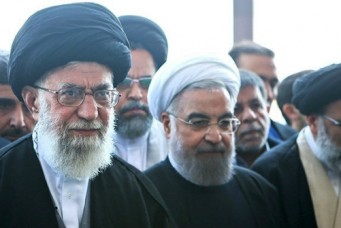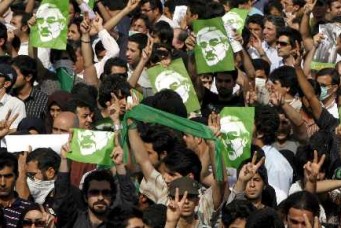Three New Trends in Iran’s Politics
The country’s ruling establishment, guardians of the 1979 Islamic revolution, confront a changing society.

Iranian President Hassan Rouhani, New York, U.S., Sept. 22, 2016. Lucas Jackson/Reuters
Incumbent Iranian President Hassan Rouhani has won reelection, and the world has expressed relief.
International observers and media have interpreted his victory as indicating that a large majority of Iranians favor internal reform over a stagnating conservatism at home, and a policy of engagement rather than confrontation with the outside world. This overlooks the fact that Iranians have sought reform and engagement for decades. At least since the late 1980s, or to be precise since the end of the Iran-Iraq War in 1988, a majority of Iranians have been asking for greater social and political freedoms, better economic conditions, and engagement with the outside world.
After the war, successive administrations, under President Akbar Hashemi Rafsanjani (1989–1997) and President Mohammad Khatami (1997–2004), tried to implement a policy of internal reforms and international engagement. However, their efforts were stymied by political rivals within the conservative ruling establishment, and the unwillingness of Iran’s neighbors and the West to respond positively to their overtures. The Iranian people’s desire for both reform and greater international engagement was further strengthened following the unfortunate and highly damaging interlude of the Mahmoud Ahmadinejad presidency (2005–13). President Rouhani’s election in 2013 and his reelection in 2017 have only confirmed the long-held desire of most Iranians for reform and international engagement.
The latest presidential campaign did reveal a number of highly significant new social and political trends in the country. These three trends brought to light the still-existing social, political, and ideological cleavages within the Islamic Republic of Iran.
Perhaps the most significant aspect of this presidential election campaign was the return of Iranian nationalism, alongside the continued Iran–Islam dichotomy. In his statements, Rouhani mentioned Iran first and then Islam. For instance, he said that he entered the race for president for a second time “for the sake of Iran and Islam.” This subtle emphasis on Iran may not seem significant, for those who do not remember that the Islamic revolution in 1979 had extremely anti-nationalist and anti-Iran aspects, to which many hardline conservatives still adhere.
In the early years of the revolution, its new leaders would not even mention “the nation of Iran” and referred only to “ummat-e Islam,” meaning the universal community of Muslims. Having so-called nationalist tendencies (melligaraei) was considered a sin and a crime. But now many openly say that Iran and its interests should be given priority over vague Islamic ideals. For example, Molavi Abdul Hamid, a leading Sunni cleric from the southeastern city of Zahedan, recently said that religion is a personal matter and the president and the government should focus on Iran and the homeland (“Iran va vatan”). He added that the country’s minority Sunni community was ready for full participation in national life and is willing to make all the necessary sacrifices for the country. Similar statements have come from the country’s other Sunni leaders.
What is encouraging is that this new sense of nationalism is more civic than ethnocentric. It is rooted both in common Iranian cultural heritage and historical memory, and in the desire for a free and law-based society. Still, hardline Islamists, although not as harshly as before, continue to resist the trend toward nationalism, and insist that religion should be the foundation of Iran’s identity. The fact that sixteen million Iranians voted for Ebrahim Raisi, representing religious tradition and revolutionary zeal, illustrates that Iranian society is still divided on the issue of what is a proper balance between tradition and modernity.
This connects with the second trend highlighted in the presidential campaign: Iranians are still divided on the issue of secularism versus religion in the country’s political life. Many Iranians prefer a society in which religion is not overly intrusive and allows for a greater space for the freedom of expression. But conservatives are adamantly opposed to what they see as creeping secularism. The recurring controversy over holding public concerts in cities across Iran is one such flashpoint in this running battle. Old guard figures like Ayatollah Shobeiri Zanjani have urged President Rouhani to make the government’s main concern the people’s religiosity, and the safeguarding of religious values. Such statements betray the 1979 generation’s anxiety over the gradual secularization of Iranian society.
Both the resurgence in nationalism and the divide over religion’s role add up to the third and most consequential divide that came out of this year’s presidential election: what does it mean in today’s Iran to be a revolutionary, and which faction—reformist/moderate or conservative/principlist—best represents the ideals of the 1979 Islamic revolution?
What remains outside of the domain of discussion is the revolution itself or its foundational principles. They can only interpret them. Yet many of Iran’s current problems derive from the Islamic Republic’s so-called anti-imperialist mission, and its commitment to the liberation of Palestine.
Yet none of these issues were discussed in the election campaign. They were only hinted at in an opaque and roundabout way. The reason for their omission is that these issues are directly linked to Iran’s current power structure. A fundamental change in the government’s Islamic principles could result in wide-reaching alterations in the country’s political structure.
Although encouraging as long-term trends, the election’s results have done little to change the underlying dynamics of Iran’s Islamic system. Even reformists like Rouhani are not willing to go as far as challenging the revolution’s foundational values. They only try to moderate them. This reluctance is because their own fortunes are linked to the current system, and a real opening of the system will challenge their power as well as that of the conservatives. But unless the foundational principles of the Islamic republic and their relevance to Iran’s current conditions are opened up for discussion, and ultimately are altered, Iran’s prospects for progress and peace will remain uncertain.
Shireen T. Hunter is a research professor at the School of Foreign Service, Georgetown University. She is the author of God on Our Side: Religion and International Affairs.





